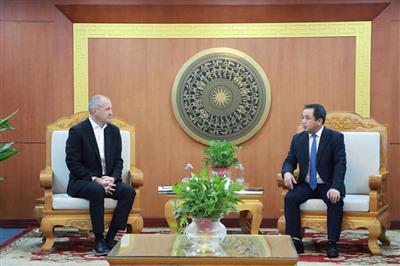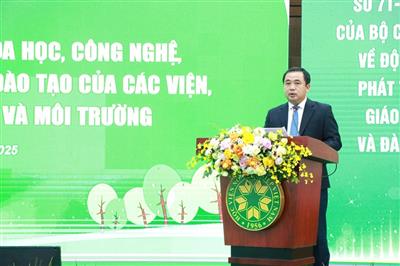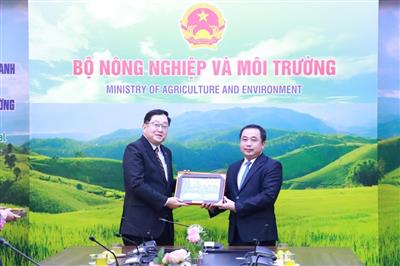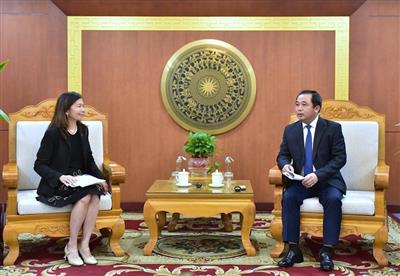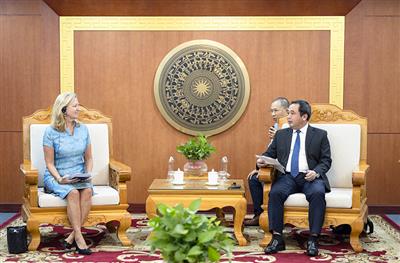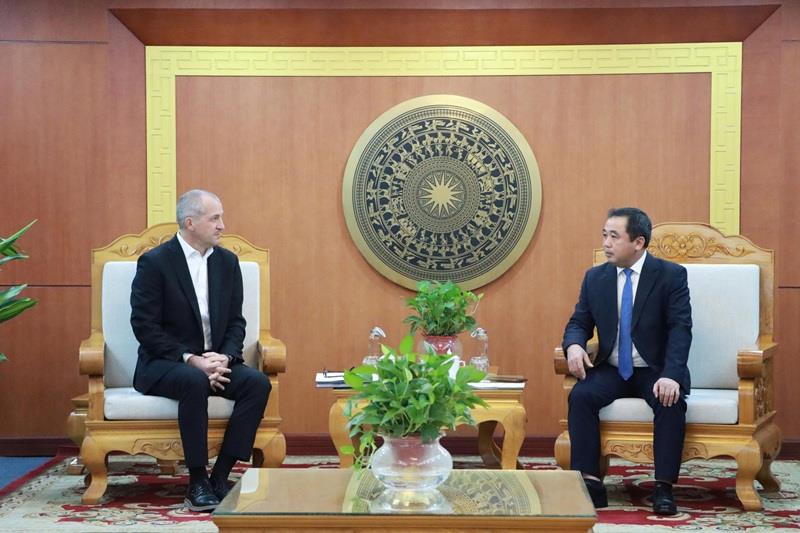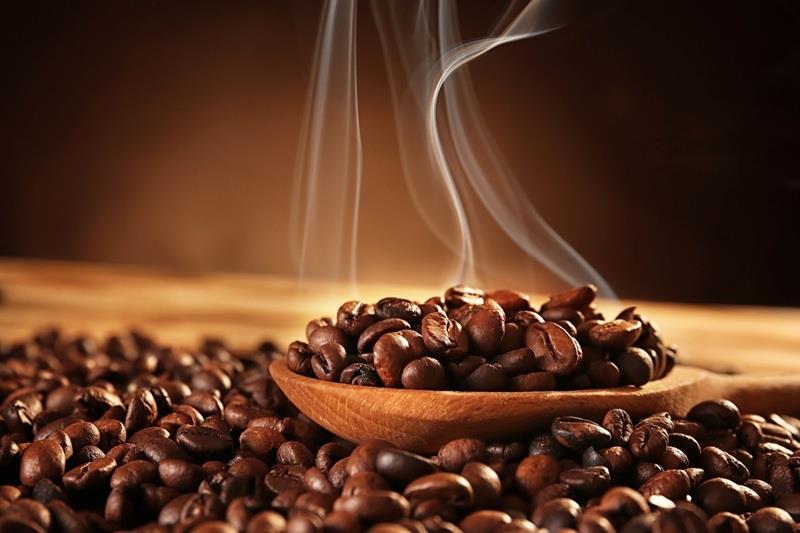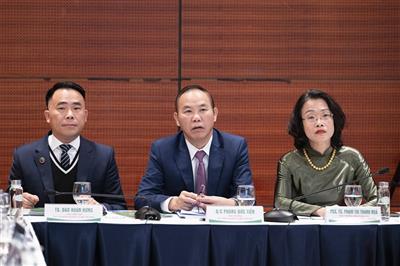
Agricultural and environmental diplomacy shaping Vietnam’s position in a new era
22/08/2025TN&MTIn an era of deepening global integration, agricultural and environmental diplomacy has emerged not only as a channel to mobilize international resources but also as a strategic tool to assert resilience, consolidate national standing, and safeguard core interests. Acting as the Ministry’s advisory hub, the Department of International Cooperation plays a pivotal role in shaping external policies, supporting Vietnam’s proactive integration, expanding markets, removing trade barriers, mobilizing international resources, and amplifying Vietnam’s voice as a respected presence on the global stage.
A new mindset in foreign affairs: Fair, effective, and anchored in national interest
At a meeting with the Department of International Cooperation on August 22, Acting Minister Tran Duc Thang underlined a principle-based orientation: “International cooperation must be fair and equal, grounded in mutual benefit, and contribute to building an independent, self-reliant economy that grows rapidly and sustainably, serving the interests of the people and enterprises.” He also urged officials to remain composed in sensitive contexts, safeguard the national image, and represent Vietnam’s stature in every engagement. This directive reflects not only a guiding principle but also a clear assertion that agricultural and environmental diplomacy must no longer remain on the sidelines—it must be active, decisive, and effective in the country’s integration process.
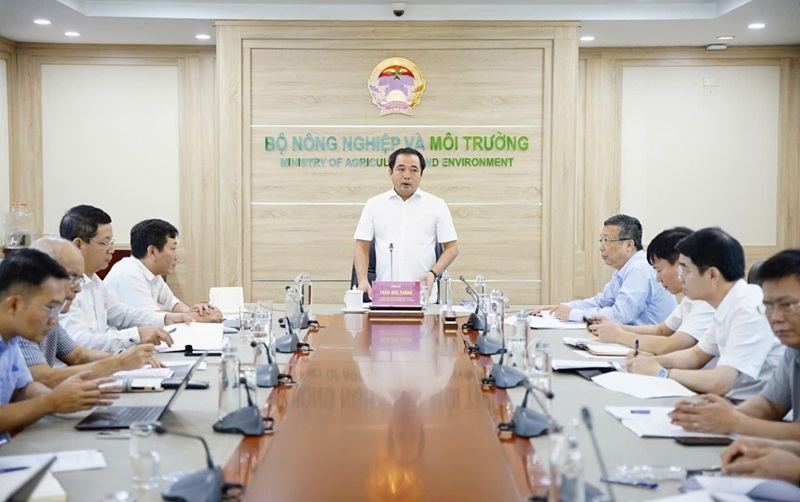
On August 22, Acting Minister Tran Duc Thang chaired a meeting with the Department of International Cooperation to review 2021–2025 results and set future directions, with Deputy Minister Hoang Trung and ministry officials in attendance (Photo: Linh Linh)
To operationalize this vision, the Acting Minister instructed that a Regulation on External Affairs be issued promptly to provide a unified framework for the Ministry’s international activities. He further called for the establishment of a steering committee to implement Resolution 59 of the Party Central Committee and Resolution 153 of the Government on international integration, to be convened immediately to assign clear responsibilities, avoiding overlap and fragmentation. “Each task must be assigned to a single lead agency with full accountability, with stronger oversight to prevent delays or omissions,” he emphasized. This is aimed at ensuring consistency and efficiency in a field as complex as international cooperation.
\The meeting also put pressing issues squarely on the table: the EU’s “yellow card” on IUU fishing and the U.S. policy of retaliatory tariffs. The Acting Minister warned against complacency, urging close monitoring and timely policy advice. Expanding into markets with significant untapped potential, such as Halal markets in the Middle East and high-value European markets, was also identified as a strategic priority, tied to the need for higher production standards, deeper processing, stronger branding, and integration into international distribution networks.
At the mid-year review meeting on August 1, Deputy Minister Hoang Trung reinforced this orientation, stressing: “The key task now is to improve the quality of policy advice and reports to Party and State leaders, accurate, concise, and accessible, avoiding excessive length or ambiguity.” He also directed that all international agreements be reviewed regularly, with a focus on substantive effectiveness rather than sheer numbers. Above all, he highlighted the importance of monitoring the implementation of directives and outcomes from high-level visits and meetings, ensuring that commitments are fully carried out and not left on paper.
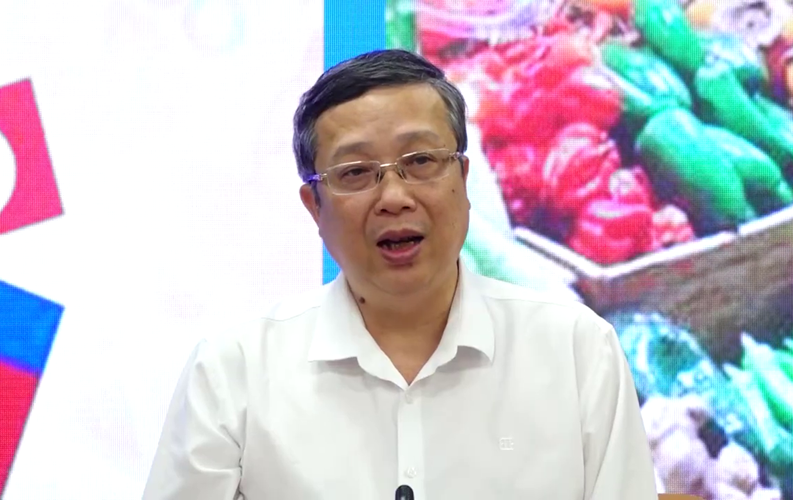
At the meeting on August 1, Deputy Minister Hoang Trung emphasized the need for concise, accurate policy advice and regular reviews of international agreements, with strict monitoring to ensure that high-level commitments are fully implemented
In the same spirit, Ministry leaders have repeatedly emphasized the importance of learning from international experience. Korea’s successful new rural development and poverty reduction programs, as well as branding strategies for agricultural and fisheries products in other countries, were cited as valuable models. Learning here is not imitation, but careful selection and creative adaptation to support Vietnam’s own agricultural and environmental transformation in the integration era.
Taken together, these directives mark a new diplomatic mindset, not merely technical adjustments, but a strategic political orientation: diplomacy must be fair, substantive, and firmly aligned with national interests and those of producers and enterprises. This is the foundation for Vietnam’s agricultural and environmental diplomacy to become more proactive, professional, and capable of shaping a new position on the international stage.
Milestones: Affirming Vietnam’s voice in global forums
The first half of 2025 was marked by vibrant and productive external activities in agriculture and environment. According to the Department of International Cooperation, the Ministry hosted 35 international conferences and workshops, welcomed 22 incoming delegations, and dispatched 3 ministerial-level delegations and 12 deputy ministerial-level delegations abroad. These figures reflect not only the intensity of the Ministry’s schedule but also its substantive engagement in multilayered international cooperation.
Vietnam also took the lead in hosting several high-profile international events. In April 2025, the Fourth P4G Summit was held in Hanoi for the first time, bringing together more than 1,000 delegates from over 40 countries. The Minister of Agriculture and Environment chaired a session on “Riding the Green Revolution 4.0: Transforming food systems for a Sustainable Era”, joined by ministers and leaders of international organizations. The session generated valuable exchanges, affirming Vietnam’s coordinating capacity and pioneering role in advancing green agriculture initiatives.
On July 15, Ministers and officials from 17 African and Asian countries gathered to discuss ways to boost sustainable, resilient agriculture for smallholder farmers
During the same period, the Ministry, in collaboration with FAO, organized a "High-Level Inter-regional Knowledge Exchange on One Country One Priority Product (OCOP) Models", attended by ministers and senior officials from 17 Asian and African countries. This was the first major international forum on OCOP, reflecting Vietnam’s commitment to sharing rural development experiences and fostering South-South cooperation. At the same time, an international workshop on ocean and coastal resource accounting brought together participants from 10 Southeast Asian countries, contributing to a common understanding and shaping cooperation frameworks for sustainable blue economy development.
Another significant milestone was Vietnam’s nomination as Chair of the 35th Meeting of States Parties to the UN Convention on the Law of the Sea in New York. This was not only a diplomatic honor but also a testament to the country’s credibility and growing role in multilateral mechanisms on global resource and environmental governance.
Deputy Minister Hoang Trung emphasized that these achievements went beyond individual events: “Tasks were executed with precision and diplomatic sensitivity, enabling Vietnam’s full participation in multilateral mechanisms. More importantly, Vietnam’s voice and initiatives are increasingly valued by the international community, not only in technical terms but also at the level of policy direction.”
Vietnam’s presence is also becoming more pronounced in ASEAN, APEC, and WTO. Ministry delegations participated fully in ASEAN’s working groups, co-chaired the ASEAN–China Emergency Rice Reserve, and contributed actively to APEC’s working groups on food, agriculture, and climate change. Vietnam finalized its dossier for ratifying the WTO Fisheries Subsidies Agreement and joined negotiations on CPTPP+ and other FTAs. These efforts reflect Vietnam’s responsible engagement while also opening broader market opportunities for its agricultural, forestry, and fishery products.
At the six-month review meeting, Director General of the Department of International Cooperation Nguyen Do Anh Tuan affirmed: “We are not only creating more opportunities for dialogue and partnership, but also asserting Vietnam’s position internationally through concrete initiatives linked to green transition, low emissions, and sustainable development. Crucially, international partners recognize Vietnam’s pioneering spirit and the seriousness of its commitments.”
Taken together, the sector’s external relations in the first half of 2025 followed the right course: avoiding formalism and focusing instead on amplifying Vietnam’s voice through substantive initiatives. This has laid a solid foundation for the Ministry to continue expanding its international role while safeguarding and advancing national interests amid intensifying global competition.
Expanding markets and removing trade barriers
In the context of international integration, expanding markets and removing trade barriers are regarded as strategic tasks for Vietnam’s agriculture and environment sector. In the first half of 2025, the Department of International Cooperation advised the Ministry to lead and directly participate in negotiations with key partners, especially the United States, a market full of both potential and challenges. According to the Department’s report, the Ministry developed an Action Plan to respond to new U.S. tariff policies aimed at mitigating adverse impacts on the wood and seafood industries. At the same time, scenarios were prepared in anticipation of the U.S. applying the Marine Mammal Protection Act (MMPA) as a trade measure against IUU fishing, ensuring the fisheries sector could proactively respond.
At the August 22 meeting, Acting Minister Tran Duc Thang stressed: “Economic diplomacy must be selective, making the best use of ODA, FDI, and international trade mechanisms, not only to attract capital but, more importantly, to acquire knowledge, technology, and access to global value chains.” He instructed units across the Ministry to treat the removal of trade barriers as a regular, sector-specific task—covering wood, seafood, rice, and other key commodities.

On July 23, Deputy Minister Le Minh Ngan presents a gift and takes for photos with Deputy Minister Amakawa Hirofumi
In practice, Vietnam has been actively engaged in multiple rounds of negotiations to upgrade or sign new Free Trade Agreements (FTAs), including the ASEAN–China Trade in Goods Agreement (ACFTA), ASEAN–India Trade in Goods Agreement (AITIGA), ASEAN–Canada (ACAFTA), ASEAN–Australia–New Zealand (AANZFTA), and CPTPP+ with Costa Rica. At the same time, Vietnam completed and submitted its dossier for the ratification of the WTO Fisheries Subsidies Agreement. These steps highlight the country’s proactive approach in defending and expanding its international trade space.
At the mid-year review, Deputy Minister Hoang Trung directed the Department of International Cooperation to continue developing a program to coordinate and mobilize resources to support agricultural exports, while working closely with industry associations to resolve obstacles. “Each officer in charge must act as the focal point, fully grasp the progress of cooperation and proactively coordinate with other units, ensuring timeliness and effectiveness,” he emphasized. This underscores personal accountability in what is often seen as a collective task, aiming to prevent delays and the shifting of responsibilities.
For priority markets, clear orientations have been identified: China, the United States, the EU, Japan, South Korea, ASEAN, Brazil, and Australia–New Zealand. In the Middle East, expanding into the Halal market is viewed as a major opportunity, though it requires serious preparation in production standards, processing, and certification. The Acting Minister has repeatedly emphasized that expanding markets cannot stop at raw exports; products must meet international standards, carry strong brands, and be embedded within global distribution systems.
Beyond trade negotiations, the Ministry is also advancing initiatives such as climate-smart agricultural value chains and the low-emission crop production program. These approaches not only serve export market expansion but also represent Vietnam’s commitment to the international community on a path of green and sustainable development. As Nguyen Do Anh Tuan, Director General of the Department of International Cooperation, affirmed: “We must combine trade promotion with FTA negotiations, supporting businesses in overcoming technical barriers and creating momentum for the export of key commodities.”
It is clear that market expansion and trade barrier removal are becoming a central pillar of Vietnam’s agricultural and environmental diplomacy. This is not merely an economic issue, but also a measure of integration capacity, diplomatic resilience, and the ability to safeguard national interests in a highly competitive and volatile global era.
Mobilizing and managing international resources for sustainable development
One of the most significant achievements of external relations in the agriculture and environment sector has been the mobilization and management of international resources to serve sustainable development. The mid-year 2025 report showed that the Ministry is implementing six loan projects totaling over USD 651 million, while preparing nine new projects worth approximately USD 1.1 billion. These include strategic projects such as Modernizing Irrigation for Climate Adaptation, Integrated Flood Risk Management, and Technical Infrastructure for the One million hectares of high-quality, low-emission rice program.
Non-refundable aid has also reached impressive levels, with 131 active projects worth over USD 315 million and 59 projects under preparation worth USD 277 million. These focus on priority areas such as food safety, water security, biodiversity, irrigation and disaster prevention, climate change adaptation, and natural resource protection—critical sectors tied to both economic development and long-term environmental security.
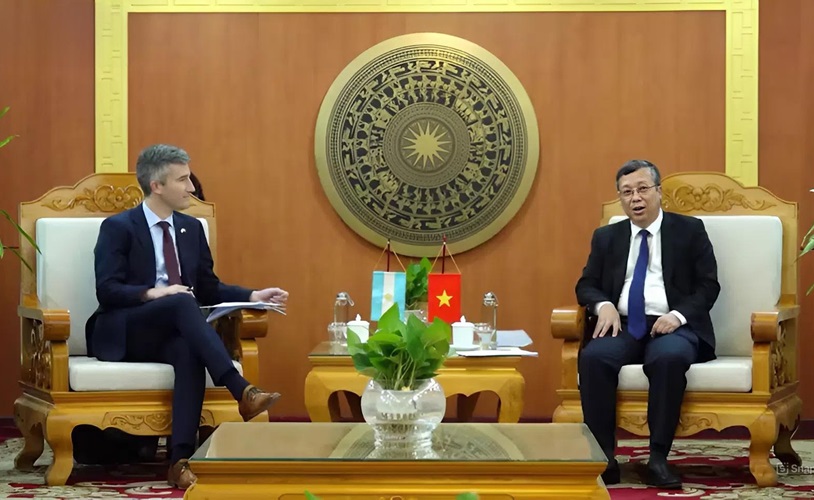
Deputy Minister Hoang Trung meets with Argentina’s Undersecretary Agustín Tejeda Rodríguez on July 1 to boost agricultural ties and explore untapped trade and technology cooperation
In terms of foreign direct investment (FDI), the agriculture sector currently has 537 projects with registered capital of about USD 3.9 billion. Including processing and related services, the figure rises to 2,400 projects with total capital exceeding USD 21 billion. These flows provide not only financial resources but also opportunities to acquire new technologies, improve governance capacity, and connect Vietnam’s agriculture more deeply into global value chains.
At the August 22 meeting, Acting Minister Tran Duc Thang emphasized: “We must filter and make the best use of international capital, especially knowledge, technology, and value chain linkages, to serve people and businesses at home.” This perspective sets a higher bar for resource mobilization, prioritizing quality and impact over quantity, and avoiding the trap of numerous but ineffective projects.
To ensure effective governance, Deputy Minister Hoang Trung also underscored at the August 1 review: “All international agreements and projects must be regularly reviewed and evaluated, focusing on substantive outcomes rather than formality.” He called for strict monitoring mechanisms from preparation and signing through to implementation, to ensure transparency and accountability.
Looking ahead, the Ministry plans to appoint Agricultural Attachés in strategic markets such as China, Japan, South Korea, the EU, the United States, and at Vietnam’s Mission to the WTO in Switzerland. This move is intended to strengthen market access, provide direct support to businesses, and enhance Vietnam’s standing in global trade mechanisms. As Director General Nguyen Do Anh Tuan noted: “Having agricultural representatives abroad is not just a diplomatic symbol, it is a practical solution to resolve technical barriers, connect resources, and facilitate deeper penetration of Vietnamese products into key markets.”
In parallel, the Ministry is prioritizing international cooperation in scientific research, training, and technology transfer. Leveraging international capital will go hand in hand with accessing advanced crop varieties, processing and preservation technologies, and smart agricultural models—factors essential to competitiveness in the face of climate change and increasingly stringent global standards.
Clearly, the mobilization and governance of international resources are becoming a key driver for the agriculture and environment sector to achieve a dual objective: sustaining economic growth while affirming Vietnam’s leadership role in global commitments to green and sustainable development. This is tangible proof of the Ministry’s proactive integration and diplomatic resolve in the new era.
Looking back at external relations in the first half of 2025, Vietnam’s agriculture and environment sector has made significant progress. International meetings and conferences were successfully convened, numerous agreements and projects were advanced, and critical trade barriers were gradually removed. Beyond market access, diplomacy has helped mobilize capital, technology, and expertise to directly benefit domestic people and enterprises.
The common thread running through these achievements is clear leadership direction: external relations must be fair, effective, and centered on national interest. As Acting Minister Tran Duc Thang affirmed at the August 22 meeting: “International cooperation must be treated as a strategic mission, with the ultimate goal of serving the interests of people and businesses, while also elevating national standing.”
Challenges lie ahead, from strict trade regulations to rising global standards for green development. Yet with a refreshed diplomatic mindset, proactive integration, and alignment from central to local levels, Vietnam’s agriculture and environment sector has every reason to believe that international cooperation will remain a key pillar, helping the country advance firmly in the era of global integration.
Ngoc Huyen



